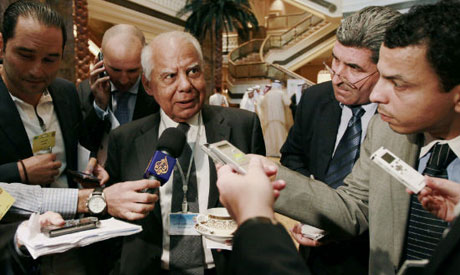
Egypt's Finance Minister Hazem el Beblawi speaks to members of the media in Abu Dhabi in September (Photo: Reuters)
The Egyptian government is currently deep in negotiations with the International Monetary Fund (IMF) regarding a loan worth over US$3 billion needed to bolster the country's flagging coffers.
An IMF mission visited Cairo this week for its 2011 Article IV Consultation, an annual meeting held with members, and reopened the issue of extending a loan. The resumption of talks suggest the ruling military council may yet accept foreign loans despite its rejection of $3bn in offered IMF funding in June.
Representatives from the Supreme Council of the Armed Forces (SCAF) are also thought to be in attendance at today's meeting.
Egypt’s minister of finance and deputy prime minister Hazem El-Beblawi has strongly defended the decision to put the option of IMF funding back on the table.
"The economy is in good health but our biggest problem is financial and monetary instability, there are not many procedures we can undertake to increase state revenue within six months or a year," Beblawi told a press conference at the finance ministry in Cairo earlier on Tuesday.
He added that the solution will be to borrow from the local market, the international market or both.
"Local public debt is approaching the limits. Yields on Egyptian bonds are increasing with every bidding, making local loans very expensive," Beblawi explained, adding that local debts will negatively affect both Egypt's balance of payments and its budget deficit.
Egypt’s deficit is expected to reach 8.6 per cent in the 2011/2012 financial year, exceeding pre-revolution estimates.
The country’s international reserves have plunged from $34 billion in January to $ 24.01 billion in September, while revenues from tourism and foreign direct investment have plummeted. Put them together and Egypt's need for liquidity is immediate.
Not everyone agrees with the need for borrowing, with some voices -- including those of government figures -- calling for a restructuring of the budget.
"We can generate revenues through increasing tax rates for the wealthiest and decreasing subsidies that are not benefiting the poorest -- like subsidies on oil products for some industries," proposed Gouda Abdel-Khaleq, Egypt's minister of social solidarity, also attendant at the press conference.
On Monday, major Egyptian business figures belonging to the General Federation of Investors Unions (GFIU) met with Beblawi and proposed the country's income tax ceiling be risen from 25 to 30 per cent.
Mohamed Farid Khamis, the owner of Oriental Weavers and head of the union, said that "higher rates in major economic powers such as the United States, the UK and China have not pushed investors away."
The finance minister has said such a measure at the moment might give a negative message to investors, though he approved of the general idea.
In June, Egypt rejected a $3 billion loan from the IMF offered at the low interest rate of 1.5 per cent. It also ended negotiations with the World Bank for a two year $2.2 billion credit facility.
Instead, Samir Radwan, then finance minister, declared that Egypt would work on cutting its deficit and financing it through local borrowing.
Radwan’s stand on foreign borrowing, which was a direct reflection of Egypt's military rulers’ view on the subject, was reflected in heavy local borrowing which drove yields upwards.
Short link: